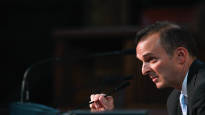CEO of the USA Anti-Doping Agency, Travis Tygart, did not spare his words when the International Olympic Committee announced its decision on Russia.
– Unfortunately, the world has been watching this bad movie for years.
Head of USADA, the US anti-doping agency Travis Tygart sums up his thoughts right away in a handshake.
Urheilu has asked Tygart for an interview regarding the International Olympic Committee’s IOC decision regarding Russian athletes. The IOC announced on Friday that it will give Russians and Belarusians the right to compete in the so-called Olympic Games in Paris next summer. as neutral athletes.
Tygart does not have time for the interview, but agrees to comment on the decision by email.
Tygart reminds that the Russian athletes who make it to Paris have been away from normal international anti-doping activities in their home country for years. Russia’s national doping control does not meet the WADA standards of the World Anti-Doping Agency.
The country’s Anti-Doping Commission, Rusada, has not met Wada’s criteria since 2015, when the country’s state-run doping program was revealed. International anti-doping circles have tried to maintain Russian doping control, but Russia’s attack on Ukraine in February 2022 made an already difficult job difficult.
Read more: Russian blood is shipped to Turkey and urine to Central Europe – this is how the doping control of top-performing track and field athletes works during the war
When you take into account the anti-doping work that has deteriorated in recent years, the corruption scandals and several hundred doping scandals that have come to light since 2015, and the fact that after eight years Rusada has still not become a full member of Wada, the IOC’s boss level does not receive the statesman treatment from Tygart.
– This is politics at the expense of principles. The Russians are said to have been subject to the same anti-doping activities as athletes from other countries. It is a slap in the face for pure sport, Tygart writes.
Dropped test counts
Athletics, which receives a lot of attention at the Summer Olympics, has made a tough policy in recent years regarding substances prohibited in elite sports. Thanks for the work goes to the sport’s independent anti-doping body, the Athletics Integrity Unit.
In addition to the national anti-doping commissions, the AIU has its own testing program, which includes the top athletes of each sport. From the testing information found on AIU’s website, there is only one Finnish athlete, the reigning WC bronze medalist in the pole vault. Wilma Murto. There are about 140 athletes in Kenya and 85 in the United States.
When Urheilu investigated AIU’s test pool in July, the proportion of Russians was very small.
– There are only 16 Russian athletes in our testing pool because of the war. Normally, the number would be around 40, AIU director Brett Clothier told Urheilu.
In recent months, the number of Russian athletes in AIU’s test battery has decreased to the 40 mentioned by Clothier. This has happened despite the fact that the International Association of Athletics Federations has not allowed Russians and Belarusians into its games, and its leaders have assured that the ban will continue next year as well.
AIU tests the best Russian athletics. The Russian National Anti-Doping Agency is the only one responsible for the testing of all other Russian track and field athletes – that is, an entity that does not have a license from Wada. It should also be noted that the testing situation in other sports is not as rosy.
– The opportunity for international anti-doping agents to do their work in Russia is non-existent, or at least it has weakened significantly. The testing activity is only aimed at a limited group of athletes, Tygart reminds.
– We have demanded transparent and independent doping testing and a test program requiring personal evaluation of every Russian athlete who receives a competition permit for Paris. Only by doing this can athletes and fans be confident in future results, Tygart writes.
Radio Suomen Urheiluhullut discussed the anti-doping issues of Russian athletes in July.
